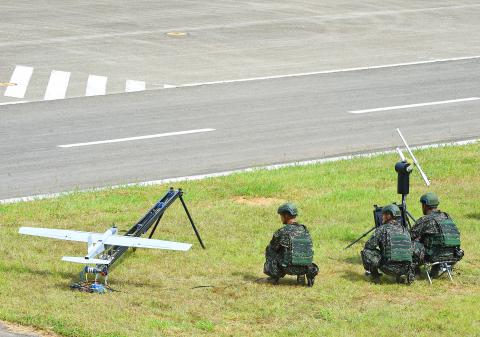The military is seeking to enhance cooperation with private-sector drone operators after civilian drones made an impressive performance in the 34th Han Kuang military exercises, a source said yesterday.
The latest iteration of the annual drill, which took place from June 1 to Friday last week, incorporated private drone operators and manufacturers, who flew reconnaissance missions in several stages, an official said on condition of anonymity.
Civilian drones and operators participated in the drills, with the latter incorporated into military units as uniformed personnel, an arrangement that delivered excellent results and was praised by the participants, the official said.

Photo: Liu Hsin-de, Taipei Times
As a result, the military is pursuing plans that would enhance military-private cooperation in drone operations, the official said, adding that the wartime mobilization of contracted civilian drone operators is among the proposals under consideration.
The military intends to compile a compendium of potential civilian drone assets and might sign open contracts with some to be on standby for wartime mobilization, the official said.
The nation’s annual military spending of US$10 billion is far less than China’s, and incorporating the private sector’s capabilities is an important step toward maximizing the nation’s resources, the official said, adding that capability gaps should be filled by private actors whenever possible.
For instance, civilian construction firms near air force bases were called on to participate in emergency runway repair drills during the exercise, the official said, adding that they also impressed the officials with their professionalism.
While the military is focusing on utilizing civilian capabilities for defense, incorporating contractors into the military’s mobilization plans remains controversial, the official said.
The military would need to comprehensively review its institutional practices before making such decisions, although it plans to make systematic changes to its mobilization plans, the official said.
In related news, the Civil Aeronautics Administration yesterday said that a forum on the innovative application of uncrewed aerial vehicles (UAVs) is to be held today to help the government stipulate rules of enforcement when an amendment to the Civil Aviation Act (民用航空法) takes effect in July next year.
Before the government enforces the new regulations, it needs to stipulate rules governing the registration, inspection and certification of UAVs, as well as operator certification, the agency said.
The public and the UAV industry are mostly concerned about how the government would oversee UAVs use and their operators, and whether it could help develop services that use UAVs, the agency said, adding that it is to solicit advice on these topics from participants.
Experts and industry representatives at the forum are to introduce systematic applications of UAVs in a wide range of areas, the agency said, adding that participants would also be informed about the latest trends in UAV technical development and rules of enforcement.

MAKING WAVES: China’s maritime militia could become a nontraditional threat in war, clogging up shipping lanes to prevent US or Japanese intervention, a report said About 1,900 Chinese ships flying flags of convenience and fishing vessels that participated in China’s military exercises around Taiwan last month and in January last year have been listed for monitoring, Coast Guard Administration (CGA) Deputy Director-General Hsieh Ching-chin (謝慶欽) said yesterday. Following amendments to the Commercial Port Act (商港法) and the Law of Ships (船舶法) last month, the CGA can designate possible berthing areas or deny ports of call for vessels suspected of loitering around areas where undersea cables can be accessed, Oceans Affairs Council Minister Kuan Bi-ling (管碧玲) said. The list of suspected ships, originally 300, had risen to about

DAREDEVIL: Honnold said it had always been a dream of his to climb Taipei 101, while a Netflix producer said the skyscraper was ‘a real icon of this country’ US climber Alex Honnold yesterday took on Taiwan’s tallest building, becoming the first person to scale Taipei 101 without a rope, harness or safety net. Hundreds of spectators gathered at the base of the 101-story skyscraper to watch Honnold, 40, embark on his daredevil feat, which was also broadcast live on Netflix. Dressed in a red T-shirt and yellow custom-made climbing shoes, Honnold swiftly moved up the southeast face of the glass and steel building. At one point, he stepped onto a platform midway up to wave down at fans and onlookers who were taking photos. People watching from inside

Japan’s strategic alliance with the US would collapse if Tokyo were to turn away from a conflict in Taiwan, Japanese Prime Minister Sanae Takaichi said yesterday, but distanced herself from previous comments that suggested a possible military response in such an event. Takaichi expressed her latest views on a nationally broadcast TV program late on Monday, where an opposition party leader criticized her for igniting tensions with China with the earlier remarks. Ties between Japan and China have sunk to the worst level in years after Takaichi said in November that a hypothetical Chinese attack on Taiwan could bring about a Japanese

The WHO ignored early COVID-19 warnings from Taiwan, US Deputy Secretary of Health and Human Services Jim O’Neill said on Friday, as part of justification for Washington withdrawing from the global health body. US Secretary of State Marco Rubio on Thursday said that the US was pulling out of the UN agency, as it failed to fulfill its responsibilities during the COVID-19 pandemic. The WHO “ignored early COVID warnings from Taiwan in 2019 by pretending Taiwan did not exist, O’Neill wrote on X on Friday, Taiwan time. “It ignored rigorous science and promoted lockdowns.” The US will “continue international coordination on infectious